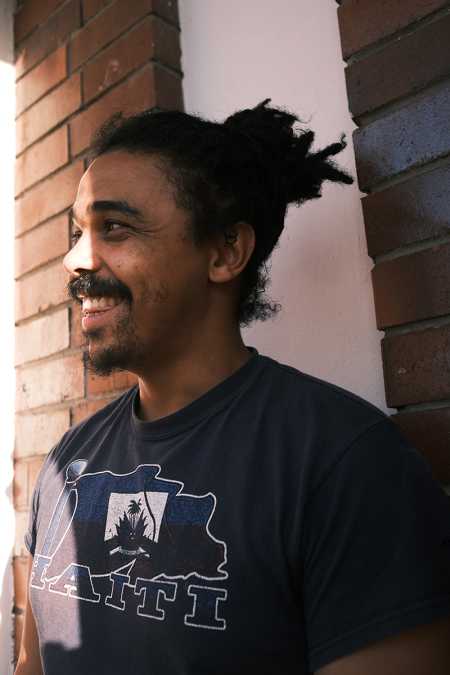A classical singer. A multi-instrumentalist. A transgender artist. An experimental pioneer of electronic music. A children’s show composer and actor. A Buddhist practitioner. A psychotherapy co-counselor. A playwright. Throughout Beverly-Glenn Copeland’s extraordinary 74 years on this planet, he has pretty much personified multitudes.
Only since 2016, when his New Age classic Keyboard Fantasies was reissued, we’ve come to realize the full extent of this multifaceted individuals’ creative past, present and future. As we link up with the New Brunswick-based musician over Skype, it’s safe to say there’s a lot of ground to cover.
Copeland’s feed shows the bright picture of a tiger. “Animals are symbols of various aspects of our personality,” he clarifies. “I have a bunch of them. The primary one is a Turtle, that’s fundamentally the animal expression of me.” The turtle is a slow, peaceful creature, known for both its longevity and unfazed resilience. “Because for years and years, I realized I was slow, but now finally I realize that was on purpose. I go towards something very steadily, it takes me a very long time to get there. But I do so with very intense focus.”
 Photo: Beverly Glenn-Copeland with his band Indigo Rising: “I met them all individually and asked them all individually, if they were willing to play with me, only to find out they’ve been playing together for years! It’s another one of those mystical things. THEY didn’t even tell me that!”
Photo: Beverly Glenn-Copeland with his band Indigo Rising: “I met them all individually and asked them all individually, if they were willing to play with me, only to find out they’ve been playing together for years! It’s another one of those mystical things. THEY didn’t even tell me that!”
Copeland is warming up for a rare live performance at Le Guess Who? with his new five-piece band Indigo Rising, breathing new life into his past works. He will be performing recent material as well. It may have been a bit overdue, but finally, his music has reached an era where it makes sense. Especially considering the influx of contemporary artists harnessing existential themes in similarly non-binary fashion. “I now realize I was making music for a generation that had yet to be born.”
A search for self-realization
Beverly Glenn-Copeland was born in Philadelphia in 1944 in a female body. But as a three-year old toddler, he already told his mother he was a boy. “And although I had since forgot about it, I continued to act like it,” he reminisces. “Which is what freaked my parents out.” Copeland grew up in a middle-class environment. Relatively privileged, keeping in mind the sheer poverty and desperation of most black families within those regions, both then and now.
While not directly impacted, those hardships did ripple down to the Copelands. In the 1940s, Copeland’s mother – a strong-willed, self-educated woman – became the first black woman to be admitted to Penn State University to obtain her master’s degree. Despite those earnings, she still wasn’t allowed on campus, until a Quaker woman kindly offered her a room in her home. So, when Copeland was twelve, the family joined a congregation of Quakers down in Philadelphia. Copeland’s father, a school principal who died far too young, had a special gift for playing the grand piano. The majesty of Chopin and Bach filling the living room, it became one of Copeland’s first formative musical memories.
Later on, in his teens, he began exploring traditional sounds from West Africa, China and India, and in the early 60s, he enrolled in McGill University’s Faculty of Music to become a classical singer. Sporting a grand three-octave range, he flourished in Montreal, even making it as far as representing Canada at the ‘67 Expo. Outside of music, however, it didn’t go as swimmingly. Living outside of the heterosexual norms in those times – when it was still outright punishable by law – caused a lot of friction in Copeland’s personal life. At age twenty, his parents pushed him to be admitted to a hospital where he would likely have been subjected to electroshock therapy; something he managed to escape in the nick of time.
Instead of holding feelings of resentment towards his parents, he mustered the inner strength to empathize with them. After all, they have given him so much love and encouragement in the early going. Copeland: “I continued having a strong relationship with them all things considered. They were struggling with being informed that this wasn’t some kind of sickness that could be cured. My parents were both massively intelligent people, reading books on the latest psychiatric developments. At the time, they were just folks who were worried that my life would become an unhappy one. So my instincts were: ‘First save your own life, then tend to your parents.’”
Copeland found himself in “all kinds of hot water” at McGill University when the assistant dean allegedly wanted him expelled for having a relationship with another woman. The pressure got too high to continue, he found the resolve to continue writing and performing music under his own terms. Copeland left Montreal – just as the Province of Quebec was mired in its own turmoil – for Toronto, to record his second album, the self-titled Beverly Glenn-Copeland, which was reissued this year on Super-Sonic Jazz label.
What makes his 1970 album such a fascinating listen, is the bold left turns he takes in its climax. From ‘The Color Of Anyhow’ up to ‘Cumberland Passing’, Copeland brandishes a lush, vivid sonic landscape, sounding very much akin to the more folk-jazz leanings Joni Mitchell and Tim Buckley. That is until the record completely breaks character with ‘My Old Rag or The Hysterical Virgin’, as Copeland trades his deft, operatic vibrato for a playful high-pitched little narrative.
The album sidetracks courageously yet again into closer ‘Erzili’; an arcane, edgy folk torrent teeming with manic energy. Thematically, there’s big a shift going on too: the album slowly unfurls from clandestine personal yearnings to a more spiritual transcendence, as substantial a transformation as any gender change. “I never sang to a ‘he’,” Copeland at one point corrects. “I always kept the gender in my songs unidentified because I was in fact always singing to a woman. The ‘Hysterical Virgin’ was a song making fun of the norm forced on or expected of women! Most songs I wrote early on are non-gender identified. I did that very purposefully.”
New crossroads
And so Copeland kept moving forward, slowly and purposefully, not swayed by any setback along the way. After years of “actively searching”, he finally found a communal space for spiritual self-realisation. In 1973, Copeland ran into a woman who told him about the Soka Gakkai Buddhist practice, prompting him to attend a small local gathering. “Oh, that was one of the most important decisions I’ve ever made in my life,” Copeland enthuses.
“I just asked a couple of questions, then I went to a meeting and heard the chanting and my whole heart and body immediately responded to it. So I began to practice , and I never regretted it. If everyday you’re chanting, you start feeling more positive all the time, feel more encouraged and more and more capable of going your own way, after a while.” These practices marked a definitive shift, as Copeland puts it, “from love songs, which are very typical for your early twenties, to music that was very much about feeling encouraged that we could make it as a species.” Songs of lament turned into songs of celebration.
 Photo: A gathering of Buddhist friends: “For over 45 years now, I attribute my Buddhist practice to awakening my joy in just being, just existing. And the joy of the fact that this universe is unspeakably awesome!”
Photo: A gathering of Buddhist friends: “For over 45 years now, I attribute my Buddhist practice to awakening my joy in just being, just existing. And the joy of the fact that this universe is unspeakably awesome!”
Five years later, a scriptwriter and friend of Copeland’s wrote a role for him to play in an episode of CBC’s children’s show Mr. Dressup. This mushroomed into a full-time slot with the show as music composer and occasional actor. It was a seamless transition for Copeland, who was able to indulge in both music and disappearing into different characters. “I’m a big kid,” he says with a resounding infectious laugh. “I could easily relate to absolutely anything that was either uplifting or silly. Or serious and uplifting, or fun things of putting things – well, I just had a blast with it all! I loved it. I wrote one song my parents utterly loved, it was called ‘The SAD-MAD-GLAD Song’, and it was really simple.” He then starts singing the song’s stanzas, each punctuated by the three titular emotions.
For almost three decades, this had been Copeland’s regimen: chanting every day at home and once a week with his Buddhist group while writing and performing for Mr. Dressup. Writing music for children, however did keep him from making personal statements, which is partly what spawned the need to make Keyboard Fantasies in 1986. Recorded in Huntsville, Ontario using an array of synths, computers and drum machines, the music vividly encapsulates a strange synthesis of spirituality and technology.
Three decades after Keyboard Fantasies’ original release – which only sold a handful of cassette copies – the album caught the ears of a Japanese record collector, who kept asking Copeland to send more and more copies. Two years down the line, the record eventually made its way as a vinyl release on imprint Séance Centre, bringing Copeland’s work back into the collective consciousness.
Primal Player
Thus far, Copeland’s remarkable walk of life has only been documented in fragments; and the more that gets uncovered, the more astounding his story becomes. From the late-eighties to the mid-nineties, Copeland moonlighted as a psychotherapy co-counselor. Like with Mr. Dressup, he was simply asked by a friend who, according to Copeland, was “a Medical Doctor and a psychotherapist, but also an incredible healer and visual artist.” In the early 2000s, when Copeland’s long stint with Mr. Dressup came to a “natural end”, he sought out to tend to his mother who was getting old and living alone. Little did Copeland know he needed immediate tending to as well.
In Phoenix, poetically enough, Copeland came inches from death, “from a sudden bowel twist”, which required emergency surgery. In the intensive care, one member of his Buddhist group was chanting at his bedside. “She was able to show up at the hospitable like REALLY fast. She’s in the room with me, as I was going through phases of shaking and stopping and shaking and stopping. And after about ten minutes, I heard her say: ‘I don’t know what to do except to chant.’ So she began chanting, ferociously chanting… and in THAT minute when she started chanting… my mind cleared.”
Somehow, Copeland survived. “I was back and running like a week later,” he preens. Turns out he honed the Buddhist doctrine for so long by this time, the chanting almost functioned like a mental defibrillator. After this brush with eternity, he briefly went by the name of Phynix, spurned by new creative juices. This surge of writing wasn’t sparked by a desperation that life is finite, but simply because that’s Copeland’s very nature. “Even before my near-death experience happened, writing music was always the same for me. It wasn’t what made me feel like I could carry on. Because I’ve been chanting for such a long time, the idea of stopping to create music or whatever never even occurred to me. It would be like me stopping eating. It’s just an instinct.”
His new creative frenzy resulted in the album Primal Player, a record echoing the same cosmic sanguine as Keyboard Fantasies. Sonically speaking, it could’ve easily been released around that same time frame. But Primal Player is less synthesis, more sum of all of the disparate influences Copeland has absorbed up till then. Dramaturgical classical sprawls (‘Back To Bachland’), African percussion-driven sacraments (‘On The Road’), down-home gospel hymns (‘This Side Of Grace’), even trip hop (‘In The Image’)... Copeland stretches his parameters far and beyond here. ‘Heaven In Your Heart’ adapts the same melodic beat David Bowie would later hold aloft in his mythical bookending epic ‘Blackstar’.
Crossin’ Over
The more conceptual follow-up Crossin’ Over is arguably just as intriguing as Copeland’s recently reissued work, if not even more so. “Crossin’ Over was my emotional attachment and re-exploration of my slave roots,” Copeland clarifies. “In the US, slaves were not allowed to have drums. Many of them were Muslims, which was something never really explored by slave masters. And because they all spoke different languages, it became very hard for them to communicate with each other. Because everything was jumbled up: you were lucky to find anyone who spoke the same language as you. So Christianity became sort of the Sunday service for two hours; it was the only time slaves could congregate with one another as a group. So they began making up songs, which sounded like very Christian songs about life after death. But they were actually coded messages on how to escape from slavery.”
For all that has been unraveled since Copeland’s music was brought back from obscurity, there are still plenty of strange coincidences and mysteries lingering about. Like how a psychic once allegedly told him he’d find new recognition in old age. And, with the theme of Crossin’ Over in mind, Copeland felt strangely unburdened from his troubles in Philadelphia when he first crossed the Canadian border to go to University in 1961.
 Photo: Beverly Glenn-Copeland's wife Elizabeth: “A brilliant woman who keeps me humble, living with someone with that much grey matter and that much talent, fully evolved, is humbling. She is a perfect example of the fact that all of us have creativity running through us.”
Photo: Beverly Glenn-Copeland's wife Elizabeth: “A brilliant woman who keeps me humble, living with someone with that much grey matter and that much talent, fully evolved, is humbling. She is a perfect example of the fact that all of us have creativity running through us.”
Finally in 2006, his wife Elizabeth – who was previously a longtime friend – came to a party to court him, because she dreamt that he would be his mate. “When I saw her – you have to remember – she was a friend of mine, and I’ve been talking to her for years, and I never EVER looked at her and thought about having a relationship of intimacy. That never even occurred to me! But when she walked into this outdoor party, I saw her from a distance, and I almost fell from my seat.” Ever since, Copeland has a partner and peer who he can share his sense of wonder, creativity and discovery with. “It was very very good for me to be with someone who is brilliant in my own arena.”
So, even with such an abundance of endeavors and experiences to reflect back on, Beverly Glenn-Copeland isn’t exactly leaning back in a rocking chair. The renewed interest in his work actually has only inspired new jolts of activity. Copeland has written and composed a musical play co-written by his wife, funded by the New Brunswick government. Additionally, Copeland is working on a new project called The Dream Tapestry, which focuses on the interconnectivity between the many cultural factions that comprise his own home ground. “I’m not surrounded by African-American culture nor African-Canadian culture,” Copeland elaborates. “I live in a part of the world that’s primarily stemmed from the Celts. I’m not able to see things as sort of a day-to-day basis to what’s happening around the world. But it’s very obvious: people are reclaiming their own authenticity no matter who they are in the world, defining themselves according to their own sense of self.”
In 1995, Copeland finally found his definitive sense of self, making the transition to life as a male in 2002. He opted not to take testosterone, nurturing that same majestic vocal prowess as when he sang ‘Complainin’ Blues’ back in 1970. Complaining, these days, has only been few and far between. “Well, I don’t get to write as often as I used to, I used to do so continuously! Right now I’m not able to because I’m involved in the business side of music for like the first time ever.” Though Copeland hasn’t performed regularly since the turn of the millennium, he is relishing the opportunity now more than ever. “I’ve only done six or seven concerts in the past seven months, for the first time since 1980, except for one concert I did in 2002. But you know what, it’s funny. Once you know how to ride a bicycle, well, you never forget how. So, I’m enjoying myself immensely.”
Beverly Glenn-Copeland's performance with his band Indigo Rising is curated by Devendra Banhart as well as Moor Mother for Le Guess Who? 2018.
Interview by Jasper Willems.




